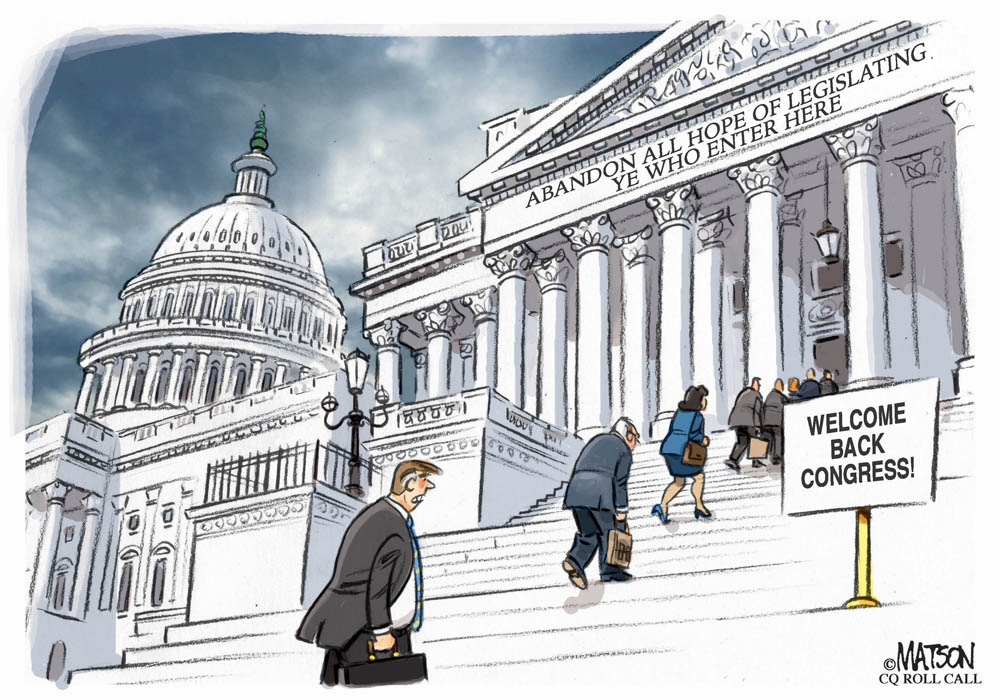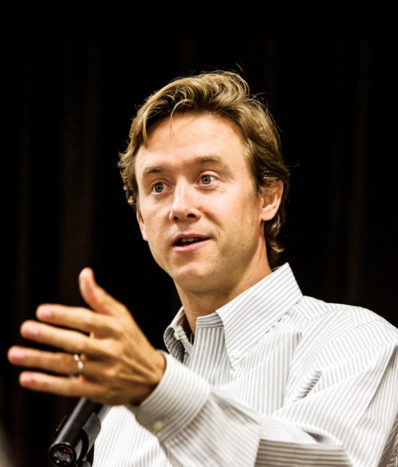
Cartoon by: ©RJ Matson, Roll Call

Mike Johnston
Mike Johnston, former school principal and state senator, says he spent a lot of time in the past year thinking about what’s broken in our democracy—and what we can fix. After he withdrew from the U.S. Senate race, the Front Porch asked him to share his reflections on the state of our democracy.
He starts by asking, “Why is it that seemingly good people who are smart and care about the country are not able anymore to solve big problems that are in front of them?”
Johnston cites both cultural and structural issues that he believes have led us here.
Ideology
“As you got fewer and fewer results that actually got delivered by bipartisanship, if there wasn’t real success to be had in delivering solutions, then the success was just in being ideologically pure….Now, if you can’t say, look, I delivered a transportation package, or I delivered immigration reform, the way you got elected was for purity, not for progress. I think that’s changed a generation of people who seek that rather than results.
“The question I always ask people is, what percentage of 100 hard issues in the world do you agree on with your own spouse? I don’t know what the number is for my wife and me, but it’s probably not more than 70. That is my most valued, closest, best friend in the world. If that’s the most you can expect from someone you are married to and have spent half of your life with, what do you think that number is with any other human being on the planet?
“People shouldn’t be pushed towards candidates or issues that are going to require a certain amount of ideological purity. That is going to divide people…it’s not where someone’s headed on a single issue. It’s how they’re able to negotiate a broad array of issues.
“I think the studies show maybe about 15% to 20% of people on either end of the spectrum are driven by those single-issue votes. We’re probably never going to agree on them. That still leaves 80 other issues to work on—those people still want roads to be paved, and they still want their schools to be well-supported and well-funded. There are a whole batch of things, even acknowledging those fundamental disagreements… I think normally what happens is you stop the conversation at abortion, and we walk away. I find it’s okay to firmly disagree on that, and then say, ‘But there’s a whole lot else that is going to give us room to work together on.’
“If you’re trying to hire for who is the person best to do the job of sitting down with folks that are different from them and taking on hard problems, failing and getting back up, and finding a way to seek common ground where people don’t agree, that is, I think, a different skill set than one who might make a great campaigner.”
The power of the people
“People have all of the power on this, and the reason why is the only threat you can get as an elected official is from some organization or corporation who is going to spend money against you to try to beat you. They think they can buy more people than you can build from good leadership. The corporations and the PACs (political action committees) will write the checks that will make the difference. The regular people will get too busy. We’ve got lives to lead, kids to raise, jobs to go to.
“I’d say that the collective bet against democracy is the bet that we won’t pay attention, and the collective bet to save it is the belief that we will be here louder and longer than any PAC or corporation will stick around. If we prove that to be true, it will change the course of American democracy. For, I think, 150 years, that was true. But as lives got busier and more complicated and corporations got bigger and more savvy, they were able to do with money what we didn’t always have the time to do with people power. But, if it becomes clear the most powerful force in politics is people, then that changes the behavior of who runs and who wins and how they govern. That is all dependent on us finding that time to vote, to make phone calls, to knock doors, to post on social media, to bring it up awkwardly at your book club or at a cocktail party that this issue matters to you and to stay at the table….That’s leveraging your actual political power in a way that matters when it’s all on the line—which is in election season.”
Structural Obstructions to Democracy
Johnston’s first concern is that our elections are a patchwork of 50 different state voting systems that vary widely. “If there’s one thing that ought to be federally protected, it’s access to the ballot,” he says.
For campaign finance he favors a system where everyone gets a $50 voucher and candidates gain their financial support by going out and talking to citizens.
He says the filibuster has made us the only major democracy that doesn’t allow the majority to rule—and cites the Colorado legislature as an example of how the U.S. Congress should function. “The gavel rule, which we have in Colorado, is a very powerful, very simple idea. Every legislator gets five bills. The requirement is every one of those bills has to have a public hearing and has to have a public vote….I think your job when you take the oath of office is to take hard votes.
“You want to keep building local systems of government that work effectively, that remind people that democracy is not the problem. We can get things done at the state legislature and we ought to expect our federal representatives to do the same thing. I do think showing up, voting, and remaining engaged are very, very powerful tools.”



0 Comments